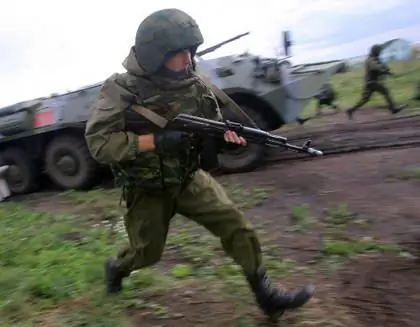- Author Matthew Elmers elmers@military-review.com.
- Public 2023-12-16 21:49.
- Last modified 2025-01-24 09:17.

Any maneuvers are a rehearsal for military operations. They, in fact, are then carried out to check the combat readiness of the troops, the degree of their training. And also in order to test those concepts of warfare that are being introduced into the troops. The largest Russian army maneuvers Vostok-2010 this year should begin only in mid-June. But the preparation for them seems to have turned into a real test of some of the concepts of modern military development.
The Khabarovsk Committee of Soldiers' Mothers (headed by Vera Reshetkina, a very authoritative and decisive person) suddenly began to receive letters in droves stating that the commanders of military units were preventing the dismissal of conscripts who had already served one year. It came to quite wild cases. So, the deputy commander of one of the battalions simply burned civilian clothes in which the demobilized were going to go home. Human rights activists have found out that the upcoming Vostok-2010 maneuvers are the reason for the mass arbitrariness. When planning them, the specialists of the General Staff did not take into account (however, I do not exclude that they did it on purpose) that the time of the exercises coincides with the mass dismissal of conscripts and the arrival of unskilled recruits. There was simply no one to prepare the training ground for maneuvers, as well as to demonstrate high skill and combat coherence during the exercises. In this situation, the commanders went on to violate the rights of the soldiers, refusing to fire them.
This story very clearly shows what, in practice, the refusal to partially transfer the Armed Forces to a contract and the intention to keep the conscript army can turn out for the country's defense capability. The army leadership does not tire of assuring: within the framework of the reform, it was possible to transfer all units and formations of the Armed Forces to a state of constant combat readiness. And now, according to the Chief of the General Staff Nikolai Makarov, no more than an hour of preparation is required for a unit to start carrying out a combat order. At the same time, no one explains how magically this will happen if, during a one-year service, every six months the personnel of the compound will be renewed by half. In fact, this means that at any given moment, half of the soldiers are recruits.
As one of the experts noted with some irony in this regard, it turns out that combat readiness is one thing, and combat effectiveness is completely different. In fact, the whole "constant readiness" boils down to the fact that the part is fully staffed by state. And what the servicemen know how to do is the tenth thing. And then it turns out that such a unit is incapable of fully participating even in maneuvers, which, let me remind you, are a rehearsal of hostilities. Note that the date of the beginning of the military exercises, the venue and their scenario are also known in advance. The same cannot be said about a real military conflict. They may object to me: a real war is preceded by a so-called threatened period, when relations with this or that country are aggravated. During this period, you can cancel the dismissal, mobilize reservists, in a word, prepare. However, what year we are told that the conflicts of the future will be distinguished by suddenness and transience. The way it was during the Russian-Georgian conflict. Despite the fact that in the Russian units there were, according to various estimates, from 25 to 30 percent of conscripts, the basis of the grouping was still contract soldiers. This can explain the fact that the group was deployed in such a quick time frame. Now, when it has been decided to actually abandon the contract soldiers, in the face of a sudden conflict, the military command will face an extremely simple dilemma. Or spend precious hours and days re-forming so as not to send recruits into battle. Or use untrained people as cannon fodder. The history of the preparation of the Vostok-2010 exercises directly points to this.






